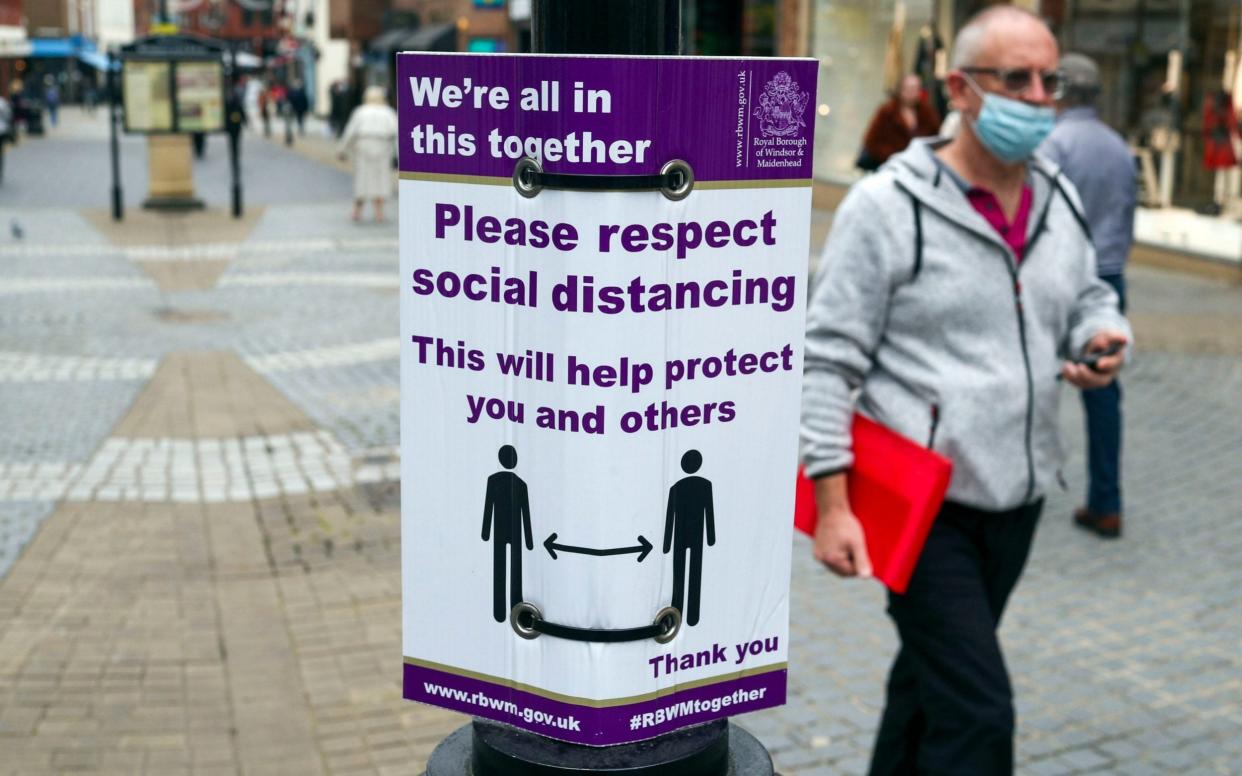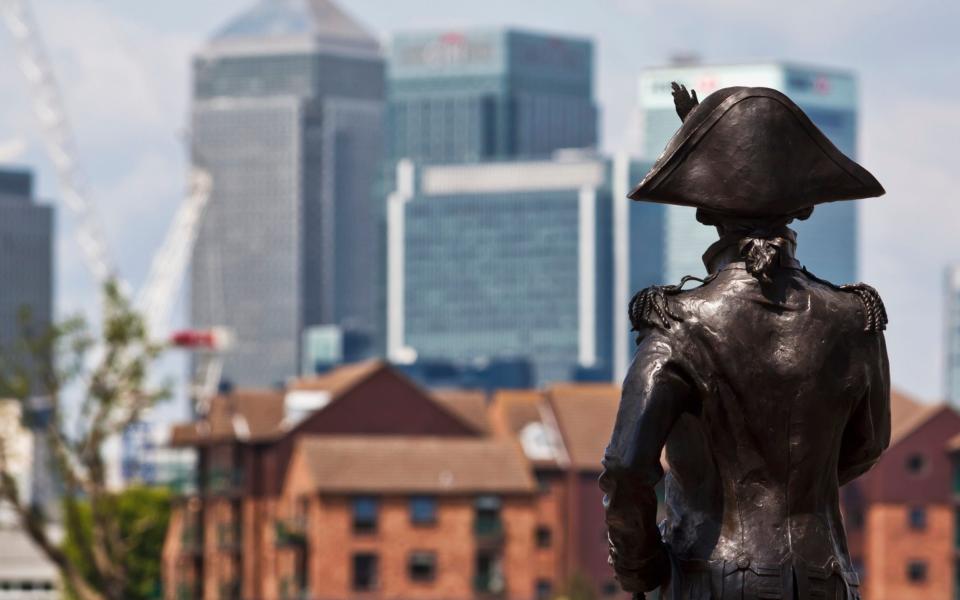Letters: Britain’s economy can’t cope with this endless stopping and starting

SIR – Our Government’s confused and illogical policies risk killing more people than they might save from Covid-19. Unemployment and bankruptcy are about to become a harsh reality for thousands.
We must urgently unlock the economy, accepting the need to live with the virus while ameliorating its effects as best we can.
The current policies are driven by panic and an over-reliance on the narrow advice of medical experts. Intermittent lockdowns will make little difference to the trajectory of the virus but cause terrible collateral damage.
The Government should provide warnings and guidance, rather than introducing more petty and unenforceable rules.
The rumblings of dissent in the North will soon spread nationwide. Many people will not calmly accept the destitution caused by the decisions of our inept ministers.
Michael Gardner
Gillingham, Dorset
SIR – The Labour politicians I have seen on television recently are guilty of trying to have their cake and eat it. While condemning the Government for locking down cities in the North, claiming that it causes economic harm, they are also calling for a nationwide “circuit breaker” lockdown.
The Prime Minister is treading a careful path, avoiding economic damage where possible and locking down only when absolutely necessary. Sir Keir Starmer would do well to support the Prime Minister, instead of trying to score cheap party-political points.
David Kidd
Petersfield, Hampshire
SIR – There are many businesses around Britain that are operating very effectively. Their stories are not being told.
A blanket shut-down would close perfectly good ones and cause entirely unnecessary damage to the economy. Attention should be focused on sectors where Covid-19 is not under control, leaving well-managed organisations to thrive.
Robin Dawson
Great Brickhill, Buckinghamshire
SIR – I recently visited two restaurants. I sanitised my hands at the entrance and waited to be called to a table, two metres away from the others. I was in contact with staff only when I was shown to my seat, had my order taken, received my meal and paid (by contactless card). Once I had left the table and chairs were cleaned.
Why aren’t restaurants being supported?
Bernard Powell
Southport, Lancashire
SIR – On my phone I receive constant requests to download the NHS Covid-19 app, to tell me if my area is low, medium or high risk. Yet the three tiers are medium, high or very high.
And the Government wonders why its messages are not taken seriously.
Robin Humphreys
Exmouth, Devon
The case for Efta
SIR – In July 2009, Canada entered into an agreement with the European Free Trade Association (Iceland, Liechtenstein, Norway and Switzerland).
A similar deal has been available to the UK since the start of this year. But because of the Government’s obsession with an EU agreement, the sequencing has meant that Efta has been made to wait until after the EU chooses to settle. Theresa May made the same mistake of thinking a realistic deal was available from the EU.
The time has surely come for the Government to contact our friends in Efta and get things moving.
Toby Horton
Ripon, North Yorkshire
Stricter shooting rules
SIR – Over the last five years, pheasant rearing has increased to almost industrial levels. While shooting does bring in much-needed income for large estates and local businesses, there is definite disquiet about this state of affairs.
The RSPB suggests that self-regulation is not working (report, October 12), and that the public will not stand by while wildlife is destroyed to protect these game birds: the persecution of birds of prey is of particular concern. There are also worries about damage to the environment caused by large quantities of lead shot and the burning of vegetation.
I am not anti-shooting, but those involved in this activity need to be held to account and redress the balance.
William Tait
Helmsley, North Yorkshire
SIR – You report (October 11) that Boxing Day hunts, a great British tradition, are to go ahead but without spectators or social gatherings.
I’m sure the hunts will respect this. Is there any chance the hunt saboteurs will do the same?
Paul Morley
Skipton, North Yorkshire
HS2 shock
SIR – I was shocked to hear that HS2 has gone further over budget already (report, October 11). Who’d have guessed that would happen?
John Stewart
Terrick, Buckinghamshire
Heated debate
SIR – I have to take issue with Peter Froggatt (Letters, October 11) on the subject of Agas.
My family and I have lived with an Aga for more than 40 years and it has always been the heart of our home. It has cooked wonderful meals (you just need to learn how to cook with it), dried and ironed the washing (no tumble driers or electric irons), heated the water (no immersion heaters) and provided warmth and comfort to us all – including dogs, cats and sick lambs.
Not for us the impersonal induction hobs and fancy electric ovens that don’t warm the house through. How can it be said that an Aga is just a lump of cast iron? Dame Mary Berry doesn’t seem to have had a problem cooking with one.
Sarah Westwood
Plymouth, Devon
SIR – Micky Tomlin’s husband was right to iron his underpants (Letters, October 11).
Ironing should be seen as the final stage of the washing process. It kills those bacteria and fungi which have survived the washing process – and some do.
Norman Defoe
Fordyce, Aberdeenshire
GPs are here for you
SIR – General practice is not closed. GPs and practice teams have been working exceptionally hard throughout the pandemic, delivering essential care to patients with Covid-19 and conditions unrelated to the virus, and doing so in a way that is safe for both patients and communities.
College data shows that consultation rates are back to near normal levels following a slump. General practice is also delivering the largest ever flu vaccination programme and preparing for a likely difficult winter.
We do not want to see general practice become a remote service. But we are in the middle of a pandemic. We need to consider infection control and limit footfall – all in line with NHS England’s guidance. Nevertheless, the data shows that more than a third of a million GP appointments are now being delivered face-to-face every day.
Professor Martin Marshall
Chair, Royal College of GPs
London NW1
Click and donate
SIR – Jill Jones (Letters, October 11), calls for “online food banks”.
I raised this idea in my local Sainsbury’s just the other day. It would be a great scheme to set up, and so easy for online shoppers to contribute.
Sarah Boustead
Bognor Regis, West Sussex
SIR – Morrisons has added a “donate” button that allows customers to give directly to local food banks.
Becky Hutchinson
Bradford, West Yorkshire
Old-school cider
SIR – Thirty years ago we decided to make our own cider (Letters, October 11) using a recipe from the Thirties. It told us to take three hundredweight of apples and wait for the travelling cider press to come by, before adding one pound of sugar per gallon of juice at Christmas. It would then be ready to drink at the sound of the first cuckoo.
We grated the apples with the Kenwood and used a small hand press. The problem came when we asked a mother of a friend to listen out for the cuckoo. Whatever we had made it wasn’t cider, so we forgot about it for the rest of the summer.
When we next tried it – clear, appley and delicious – we couldn’t understand why we became so intoxicated. Then we tested it: 17.2 per cent alcohol. We drank it from wine glasses after that.
Ros Mackay
Helston, Cornwall
Don’t drag Nelson into the culture wars

SIR – It beggars belief that the National Maritime Museum plans to “review” the displays of various historic naval officers, including Horatio Nelson, in order to “capitalise on the momentum built up” by the Black Lives Matter movement (report, October 11).
The idea that serving members of the Armed Forces are responsible for (or even support) national policy is extraordinary. Many serving officers disagreed strongly with the involvement of recent governments in Iraq and Afghanistan, for example, but they got on with what they were ordered to do.
Lord Nelson himself was never even senior enough to have been a member of the Admiralty Board; he was simply a serving officer doing his job. To infer that this made him in some way responsible for colonialism is incredible.
Lt Col Ray Aldis (retd)
Salisbury, Wiltshire
SIR – Archive material has revealed that in 1834 over 46,000 people in Britain owned slaves. These owners were compensated financially when abolition was achieved. This means that hundreds of thousands of their descendants, alive in Britain today, may have indirectly benefited as a result.
Moral values were different two centuries ago. It therefore seems unjust for the National Maritime Museum to single out Lord Nelson and others for vilification. Slavery is evil and the Navy later helped to suppress the slave trade.
How will our own moral values be judged in two centuries’ time? Our descendants may well ask: “Did people really eat animals back then?”
Colin Henderson
Cranleigh, Surrey
SIR – Lord Nelson once remarked: “I could not tread these perilous paths in safety if I did not keep a saving sense of humour.”
My sense of humour vanished on reading that his memory is to be re-evaluated.
Lt-Cdr Chris Watson
Warnbro, Western Australia
Cyclists must do more to make themselves seen
SIR – It is not just bells that need to be fitted to bicycles (Letters, October 11).
They should also be equipped with fixed (not flashing) lights, white to the front, red to the rear – and not on the rider’s body. Then everyone can see the cyclists and take avoiding action.
Peter Clark
Canterbury, Kent
SIR – In these days of health and safety, I cannot understand how some newsagents still allow their early-morning deliveries to be carried out by cyclists, often teenagers, who do their work without helmets, in dark clothing and on bicycles without lights.
David Syme
Edinburgh

